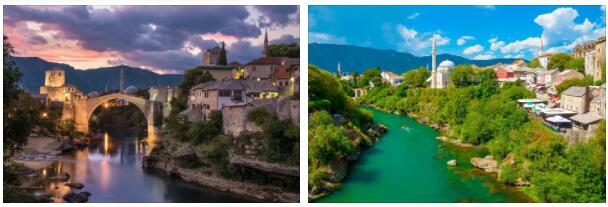Typical Bosnia and Herzegovina
Bosnian slippers
Many Bosnians wear papuce at home. These are slippers that look a bit like from an Aladdin film and are reminiscent of the fairy tales from the Arabian Nights. This oriental style comes from the fact that the slippers were brought to Bosnia and Herzegovina by the Ottomans during the occupation of the area.
Really traditional papuce are still made and embroidered by hand. Each shoe is unique, i.e. a one-off. They have a leather sole and are often covered with plush on the outside. Some are decorated with pearls. It is also an old Bosnian tradition that the mother-in-law gives the bride such shoes after the wedding, with which she is then supposed to enter the husband’s new house for the first time.
Bosnian coffee
Coffee is a popular drink in many Balkan countries. The hot beverage is also popular and very typical in Bosnia and Herzegovina. However, Bosnian coffee is not just any coffee, it is made traditionally. The beans are ground by hand. That is pretty exhausting, because with the seven kilo mortar called Dibek you need a whole hour to grind 100 grams of coffee.
But for good Bosnian mocha you would definitely not use an electronic mortar, because this grinding process causes the beans to get hot during grinding and lose their aroma. So the traditional coffee is even stronger and more aromatic.
People also like to drink particularly good coffee from beautiful porcelain dishes, which can be bought in many shops in cities like Sarajevo. It is best to invite acquaintances, friends or family to have a coffee and enjoy the local specialty together.
Different ethnicities – different festivals
There are very different holidays in the Serbian Orthodox, Catholic and Islamic religions. Because the different population groups each have their own religion, there are correspondingly many holidays. The Nova Godina festival is the New Year and is actually celebrated by everyone, even if according to the Julian calendar of the Serbian Orthodox Church it does not take place until January 13th. Labor Day, Prvi maj, is also celebrated by everyone and takes place on May 1st and 2nd across Bosnia and Herzegovina.
But in addition to these national holidays, which apply to all Bosnians, there are also national holidays within the republics, which unfortunately underline the differences between the ethnic groups. The Serbs, for example, have their own controversial national holiday. The Serbs do not celebrate Independence Day (Dan nezavisnosti) on March 1st. He commemorates the conclusion of the referendum on independence on February 29/1. March 1992. At that time the Serbs were against leaving Yugoslavia.
Traditional dance in Bosnia and Herzegovina
A popular round dance, the Kolo, was danced in Yugoslavia. It is very popular among Croatians, Serbs and Bosniaks. At Kolo, at least three people dance together, holding onto their hands, hips or shoulders. There are different ways to dance the kolo. Sometimes you use your hips more, sometimes your legs.
Everyday Life
There are still mines
The war in Bosnia and Herzegovina has been over for a long time, but it has left its mark to this day. During the war, land mines were used and hidden in many parts of the country. But because these places were often not recorded on maps and heavy rains washed the mines in many places, nobody really knows where they are and thus also not how to remove them all.
Children who play outside in nature are particularly at risk from this danger. Most of the mines are located along the former frontline and in remote areas with forests or meadows. About 500 people have been killed and 1200 injured by these mines since the war. Today not too many such accidents happen, around 20 a year. Nevertheless, one should be aware of the danger.
Sports
In 1984 the Winter Olympics took place in Bosnia and Herzegovina. Souvenirs for the games are still available today, while many of the former stadiums have been destroyed. The former Olympiapists of Bjelasnica and Jahorina are still visited and used today.
In addition, people in Bosnia and Herzegovina love to play football. In 2014 the national team qualified for the World Cup. But not everyone in Bosnia and Herzegovina cheered on this team during the games, because the Bosnian Serbs preferred to applaud the Serbian team from the neighboring country. This is evidence of the unfortunately persistent disagreement in the country. Of course, it’s not just the country’s national team who like to play the popular ball game, you can also see many children playing enthusiastically on the streets.
Minorities
The major conflict between the ethnic groups of Bosniaks, Serbs and Croats in Bosnia and Herzegovina often dwarfs the problems of minorities.
For example, members of the Roma live in the country who are exposed to disadvantages and discrimination in the country. Roma children often have no access to education and are often marginalized by their classmates in school.
